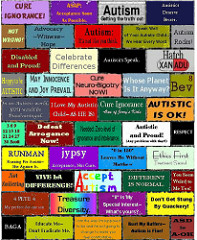I was going to call this my “Hope For 2015”, but that is so passive and useless. Anybody can – and lots of people do – post warm, fuzzy notes with Hopes for the New Year, and others click and share. Lovely.
But this is NOT all warm & fuzzy. It’s literally dead serious (with many murdered throughout the year), and quite often blunt, because I am blunt at times. It’s also a call to a change of perspective for some of you.
Deal. Think about it. I’m not a lone voice. Click and share.
MY CALL TO ACTION IS FOR YOU TO READ THIS THROUGH, THINK, AND SPEAK UP. ALL YEAR LONG.
And the next year and the next.
This isn’t about some stranger, or Those Other People, or “That Kind”.
Children with disabilities or other differences are not diseased or broken. The same is true for adults. Yes, those “poor, little disabled children” grow up into disabled adults. Gee, so where’s the concern now? It sure isn’t at work; in the U.S. general unemployment is at 5.3%, but for disabled adults it’s twice that at 10.8%.
Nor are autistic or ADHD children some kind of modern mystery; millions of such adults have been around for decades, just unrecognized for lack of diagnostics. Most of us are profoundly relieved to find out Why. We still have to deal with the details, but that’s easier when you know that not all your difficulties are from some kind of moral failing, or from a lack of trying (and trying, and trying).
WHAT, YOU NEVER HAD KIDS LIKE “THAT KIND” IN YOUR CLASSES? YOU KNOW WHY?
Some were kept at home, because until passage of the IDEA in 1975, US law did not require public schools to teach everyone.
Some were warehoused in institutions, badly treated, undiagnosed or misdiagnosed, and oft uneducated.
But many of us were there; how we struggled through school and life, without accommodations or understanding, and often the target of bullying by peers and even school officials.
Untold numbers of women and men just knew themselves inexplicably “a bit odd”, and did best they could; some succeeding, others not so well.
At worst are those who not only lacked resources, but were shunned by society’s classism, ableism, racism and sexism, and (if still alive) are found among the imprisoned, derelicts, addicts, abused and enslaved populations.
YOUR CHILDREN AND EVEN COLLEGE STUDENTS WILL LEARN DIFFERENTLY, SO YOU MUST ADJUST
We are neither inherently stupid nor incapable of learning. Learning differently means teaching differently. Find what works. Everyone has limits, but a consistent lack of success means you should use another method, as well as more time. Sometimes the learning is highly irregular in pace. Tie learning to interests to motivate your children and students.
Also, be aware that sometimes the “simple basics” may be entirely bypassed by some students who leap to master higher concepts, albeit often forever struggling with those seemingly “simple basics”. People are humans, not robots. Learning is not always linear.
COMMUNICATION IS NOT JUST SPEAKING
Never assume that just because someone is nonverbal they cannot communicate. If you’re not getting their messages, then *you* are doing something wrong. Nor should you assume that because someone is nonverbal that they cannot understand what people say (though the processing may sometimes be delayed). Nor assume that because someone has been nonverbal for years that they’ll never speak. And damn, will you get an earful.
INCONSISTENCY IN DAY-TO-DAY ABILITIES IS FRUSTRATING FOR ALL, AND NOT A CHOICE
Importantly, just because someone is able to speak or do a task one day, that does not guarantee consistent results. It’s the nature of disabilities — regardless whether considered mental or physical – all involve the brain. Brains are funny things, and many of us have a few buggy Beta-version programs in our wetware. It’s frustrating as hell for all involved.
But don’t assume the “could-then-can’t-now” is intentional. “Oh, he can hear me when he wants.” “Well, you could solve those equations just fine yesterday.” I can guarantee that after a lifetime of such, ridiculing people and punishing them for things they cannot help only increases performance stress.
While that stress might increase focus from sheer terror, it often squelches overall functioning. (Do you want me to listen to you, or try to recall yesterday’s process, or slowly figure it out on my own? I can only do one — if my stomach will stay down.)
TRAMPLE THE TROPES
Ignore the media tropes and centuries of religious hype: disabled people are neither inherently amoral, soulless and evil, nor are they infinitely happy, friendly and angelic. People are people. A few will be nasty bits, some will be profoundly good sorts, and the rest are just ordinary folks who get mad, sad and glad, who screw things up sometimes, and who will also serve others selflessly despite bearing more abuse than anyone should.
We are definitely not incomprehensible, incomplete, little autism-puzzle-pieces, unloving, unlovable, or uncaring.
We are whole people with all the same cares, needs and wants as all humans. Beware — disability happens to anyone at any time. We aren’t a Them, and YOU can be among the world’s 15% in just one day. We are all Us.
STOP “TEACHING TOLERANCE”
Because tolerance means putting up with something one doesn’t really like, or that doesn’t really belong. We want full-fledged ACCEPTANCE.
Nor should we only be acceptable if we can somehow “overcome” our differences enough to pass for Normal Real People. Trying to “pass” all the time is exhausting, and invariably breaks down, oft resulting in the [supposed] Normal Real People assuming that one is lazy, stupid, crazy, all the above, or worse.
Training children for hours a day how to artificially perform “acting normal” does not serve to help them learn how to function best in the world. Yes, of course teach good manners, social and work skills. But suppressing every twitch of one’s natural being adds to stress, making everything else yet more difficult. This is especially when performing like a “normal person” means not doing the harmless things that reduce stresses.
STOP THE BLAME
I must call out the terrifying, unaddressed assumption which underlies so much daily trauma: “The reason the disabled [children] are targeted by bullies is because they are perceived as being weird”. Despite the pervasiveness of this social theme in society, most people are functionally unaware of it, all the while instilling in their Normal People children the same message. Normal People children need to act normal, and not act like That Kind. After all, that’s how the Normal People know the others are That Kind, who’s Us and who’s Them.
But it’s the disabled and different who are taught, over-and-over-and-over that not only is it their fault for behaving or looking weird, BUT ALSO if they weren’t so weird, well then they wouldn’t be bullied. “Quit being so weird! Just say No! Just say Stop.”
Just say BULLSHIT. Because this is blaming the victim. The problem is not that everyone isn’t the same, the problem is that there are bullies.
Even worse, blaming the targets actually empowers the bullies, because the social story says it’s the victim is the one who is acting wrong, so it’s not really the bully who is to blame.
Let’s just top off all that existing anxiety and depression with the trauma of trying to seek justice, but being told again that, “Well it’s your fault, you know. Attracting attention by being weird, and bugging people. You need to quit making trouble now. You already take up too much of our time with all of your “special” needs. Quit whining and go deal with it. — But no fighting, because we’ll know it was you who started it.”
By the way, it’s not “just a kids at school” thing that everyone will “grown out of”. It continues on through college, and happens at work, too.
YOU CAN’T WALK IN THE LITTLE BOY’S SHOES;
THEY’RE FLOATING DOWN-RIVER
It is NEVER acceptable to murder disabled children. Nor should these repeated, horrifying events be considered “understandable” or “excusable”, with the murderers being pardoned just because their son or daughter had a disability.
Increasingly more prevalent in social media, the crime becomes insidiously deemed more and more acceptable. Murderers re-cast themselves as martyrs, acquiring champions to their cause. Throughout repeated blog posts and news stories, they bemoan how taking care of disabled children is just too unbearable, they had to take care of them every day of the week, there was never any relief or help. (Even though there was.) Cue the groupies’ hand-wringing and protests upon the villains’ behalf: “Oh but won’t you walk in their shoes, how they’ve given up their lives, this wasn’t at all what they wanted.”
For in true sociopathic fashion, the poor, long-suffering parents revel in the attention, announcing to the world – sometimes ahead of time — what they have done, and all the while describing themselves as the victims. The dead children (young or adult) are unwanted, and deemed unwantable, less than human just because they couldn’t speak, or needed medical treatments, or used a power chair, or didn’t play with their toys the “right way”, or wore adult diapers … No one would want to live like that; the thing’s better off dead. And what of the groupies? Well, where do you think people get such terrible ideas that it’s okay to kill one’s own children?
ENOUGH WITH THE “DISABILITY INSPIRATION PORN”.
Quit using those heart-tugging videos, walk-a-thons, telethons, and other grand-society functions to win your supposed Cosmic Brownie Points for giving us your pity. Please stop dumping upon us the largesse of your unwanted rags (so Victorian, so passé), or creating useless functions requiring us to serve as targets of unwanted helpful-helper-helpiness for your ego-boo.
Get disabled people out of “sheltered workshops”. Yes, people need work they are suited to. But the segregation and token sweatshop “wages” are an embarrassment and humiliation to all.
YES, CHILDREN GROW UP.
YEP, STILL DISABLED, BUT NOW ADULTS
Do not assume your children will remain permanently childish and incapable — they mature on their own timelines. Allow adults to be adults. Support their needs and interests, but neither dress them like children, nor expect them to live their lives in naïve pre-puberty stasis, without adult desires for socializing with adult peers, life-long learning, mastering skills for some kind of job (even if that job is “just socially productive work” rather than traditional work), and yes, having a love life, however that may be expressed.
YES, PEOPLE ALSO NEED ACCOMMODATIONS;
THAT DOESN’T MEAN “CURE”
Most disabled or different people are not looking for cures to magically change them into someone else, some kind of fantasy Normal Real person that their families wanted instead. Our differences may result from physical events, by random mutation, and / or genetics. Your genetics. We are family. I’m Me, and I like being Me. If you somehow changed all the differences in my brain, I wouldn’t be Me anymore, with all my quirks and abilities.
Of course it will be great to find a means for preventing migraines, epilepsy, fatal medical conditions, et cetera. But it’s also a sad fact that some people have been so convinced of their undesirability as disabled human beings that they can only see “cure” as a means to being an acceptable Normal Real Person. (Worst of all, some people commit suicide because they’ve been taught to hate themselves, as useless and unwanted.)
But what’s really alarming is all the fund-raising, talk, research, and work going on today to eliminate entire kinds of peoples. I’m talking about the thousands of selfish individuals and sociopaths who believe that anyone with neurological or morphological differences should not exist at all, because That Kind takes up too much time, money, and resources.
That’s not “looking for a cure” – that’s eugenics and euthanasia, the same ideas that led to the Nazi Aktion T4 program and other horrors. (In my youth, the state hospital was still in the regular habit of sterilizing people. Had I been institutionalized, I might well not have had my lovely children and grandchildren.)
Yes, we want assistance, we want things that help us achieve what we want in life. Getting the things one needs to learn effectively, to move about, attend to their own needs, to work, to play, to be a part of the community, to have lovers or families. These things should not be seen as extraordinary, special, absurd, or a waste of money, just because they aren’t the same kinds of things used by other people. 15% of the people in the world have disabilities. That is a lot of humanity, and many are uneducated, abused, neglected, avoided, or shut away, depriving the world of incredible amounts of untapped abilities and talents.
CALL OUT BULLSHIT. REQUIRE ACCOMMODATIONS. DEMAND ACCEPTANCE.
MAKE IT SO.












You must be logged in to post a comment.